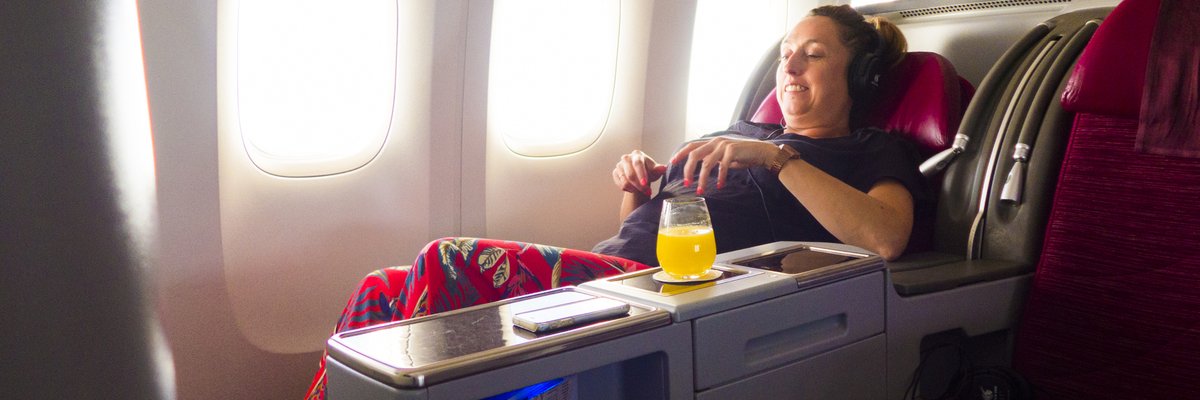Here Are the 4 Most Important Features to Look for When Booking Business Class
KEY POINTS
- The most important feature to look for with business-class travel is comfortable, lie-flat seating.
- A high-quality meal service also makes your flight much more enjoyable.
- Last but not least, look for an airline with a good track record of reliability and tickets available at a reasonable cost.
You get a lot of benefits when flying business class. Some of them make a huge difference in your travel experience and absolutely justify the added cost, whether you pay in cash or miles earned with your credit cards. But there are also some that, while nice, aren't exactly gamechangers.
For example, most reviews of business-class flights that I've seen talk about features like in-flight entertainment offerings. Being able to watch a new release is cool, but not exactly a big deal to me. With laptops, tablets, e-readers, and handheld video game systems, it's not hard to stay entertained without ever touching the entertainment system.
I've been flying business class for years, and there are a few perks I always focus on. Whether you're comparing business class options with multiple airlines or trying to decide if flying business class is worth it for your next trip, here are the most important features to look for.
1. Lie-flat seating with comfortable bedding
The one feature I always prioritize when flying is the seating. That's especially true in business class, as the main point of spending more is to have a more comfortable flight.
Every airline offers much larger seats in business class than in economy, but the quality varies. Before booking, first check if the airline offers lie-flat seating on the flight. This information is usually available as you book, and you can also find out by plugging the flight details into SeatGuru.
It's also worth checking reviews to see what other travelers thought of the bedding. Some airlines do a great job of making passengers comfortable with quality pillows, blankets, and seat cushions. Others, not so much. Seating and bedding is a good deciding factor if you're choosing between a couple of airlines.
2. Well-regarded meal service
Meal service is another area where quality can vary quite a bit from airline to airline. Some carriers have an excellent selection of food and drink options, from recipes by Michelin-starred chefs to wines chosen by top sommeliers. On other airlines, the meals are bland and unimaginative, even in business class.
This is another item I'd suggest reading about in reviews from previous passengers. A good meal can really improve your trip -- I still remember a breakfast on an Air France flight just because of how delicious it was.
Meal service is especially important on longer flights (anything lasting four to five hours or more). It's nice when you don't need to eat a big meal at the airport right before your flight or bring a bunch of food with you.
3. Good reliability and passenger satisfaction ratings
No matter where you're sitting, flying is ultimately about getting from one place to another. Flight delays and cancellations are still frustrating, even in business class.
That's why I try to pick airlines with above-average reliability whenever possible. AirAdvisor provides yearly rankings of the most reliable U.S. airlines. For international airlines, you can often find reliability ratings with a quick search online. Another method I occasionally use is looking up the flight I'm interested in on FlightAware. Then, I'll look at the recent arrival and departure times to see if it tends to arrive on schedule.
While you're reading up on the airline, see if you can find passenger satisfaction ratings as well. For U.S. airlines, J.D. Power provides yearly passenger satisfaction ratings. These can give you an idea of which airlines tend to go above and beyond and which ones provide only the bare minimum.
4. Available at a reasonable cost (in cash or miles)
Business class can be expensive. Tickets sometimes cost $4,000, $5,000, or more. Most people wouldn't want to drop that kind of money on airfare, so the price tag is also a key factor when booking business class.
Fortunately, there are ways to save on business class. There are often deals available if you shop around and are flexible about your travel dates. And if you're flying to an affordable destination, such as Latin America or Southeast Asia, cash prices might not be bad.
But often, the best option isn't booking in cash -- it's booking in miles. I pay for most of my business-class flights with rewards I've earned using travel credit cards. One of the best options is the Chase Sapphire Preferred® Card (see rates and fees). It has a big sign-up bonus for new cardholders, and you can transfer the points you earn to quite a few airlines for business-class bookings (Chase also has hotel partners where you can transfer your points).
Click here to apply now for the Chase Sapphire Preferred® Card.
With everything that a business-class ticket offers, it can feel like information overload. To decide if you should book one, you're better off focusing on a few key features that have the biggest impact on your travel experience and your budget.
Our Research Expert





